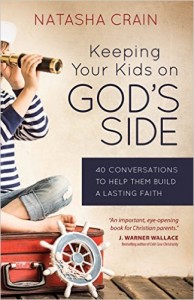 It’s amusing to hear accusations of indoctrination from the leaders of a virulently anti-intellectual movement. New Atheism has evolved 140 characters at a time as Know-Nothing authors endeavoured to shield their acolytes from philosophical and theological arguments. Still, we ought to give credit were credit is due. The New Atheism has a touching concern for the well-being of our children. A little over a year ago, Dawkins opined to the Irish Times:
It’s amusing to hear accusations of indoctrination from the leaders of a virulently anti-intellectual movement. New Atheism has evolved 140 characters at a time as Know-Nothing authors endeavoured to shield their acolytes from philosophical and theological arguments. Still, we ought to give credit were credit is due. The New Atheism has a touching concern for the well-being of our children. A little over a year ago, Dawkins opined to the Irish Times:
“Children do need to be protected so that they can have a proper education and not be indoctrinated in whatever religion their parents happen to have been brought up in.”
Lawrence Krauss concurred:
“Parents, of course, have concerns and ‘say’ but they don’t have the right to shield their children from knowledge.”
With such concerns in mind, we would expect Natasha Crain’s Keeping Your Kids on God’s Side to provide master classes in the subtleties of brain-washing, or an “Idiots Guide to Religious Programming”. After all, children are impressionable and parents have an authority which can be abused for the sake of the Gospel. Shouldn’t consistent Christians – who believe that the souls of their offspring are at stake- just coerce children into faith for their own good?
In fact, Natasha Crain argues that Christians should encourage children to think critically and advises Christian parents to expose their children to the best arguments for and against Christianity. This follows directly from her evangelical (and thoroughly biblical) understanding of faith. Faith is total trust in God’s gospel and a deep conviction that Jesus died and rose again for us. So faith is more than true belief – it transforms our characters and the direction of our lives. To be authentic, this faith must come from a persons inner being. It is impossible to coerce or indoctrinate a child into true faith, for God would only be interested in faith which is truly and freely accepted and given.
Furthermore, Crain points out that Christians want their children to know that the Gospel is true, and knowledge is significantly more than true belief. If I correctly guess tonight’s lottery numbers no-one would claim that I had knowledge of the winning combination in advance (unless they were accusing me of cheating or clairvoyance). I simply got lucky. To know a truth I must have a belief that is formed in the correct way; very often, that means that I must consider argument and evidence. So, if we want our children to know that the Gospel is true we must teach them that the Gospel is not a “cunningly devised fable”; that the Gospels provide reliable testimony of Jesus’s work and words.
It is refreshing and encouraging to read a Christian book that treats both parents and children as rational agents. As a mother of three, Crain knows that children are surprisingly capable of critical thinking and that pre-teens can be relentlessly, exhaustingly sceptical. She is correct to view this a challenge and an opportunity for Christian parents. Wisely, she puts the onus on parents, not youth-pastors to rise to the challenge. She puts nourishing young minds ahead of fun youth activities and catchy worship songs.
Her book, is served in bite-sized chunks, so it can function both as a quick reference guide or as a light read. Her writing is both charming and engaging as she effectively briefs parents on 40 different conversation topics- from the evidence for God to the history of the Crusades. But, surprisingly, this book is a powerful apologetic in its own right. It neatly answers the charge that consistent Christians should be blind dogmatists who indoctrinate their young. Crain’s book illustrates that only a blind, uncritical, dogmatic atheism could hold that understanding of true faith.

